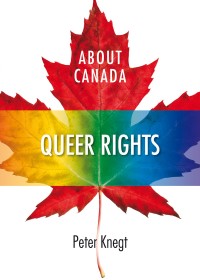About Canada: Queer Rights reviewed on Three Dollar Bill
“The Truxx raid never changed the attitudes of Montrealers towards gays and lesbians and it certainly didn’t inject pride in the gay community,” veteran gay activist Michael Hendricks-who has done more for gay civil rights in Canada than probably any judge or politician-told me for the only published history of Sex Garage, in Xtra. “That’s why I believe Sex Garage was Montreal’s Stonewall. It created community and brought us together in a common front. It also brought English and French together. We founded a group called Lesbians and Gays Against Violence and kept parading around the city for another two months.” LGV was the predecessor of La Table de concertation des gaies et lesbiennes du grand Montreal, the political-action group pivotal in lobbying for the Quebec Human Rights Commission’s historic 1993 public hearings on violence against gays and lesbians.
Later, La Table was also key in lobbying for the 1999 passage of Quebec’s historic Omnibus Bill 32, which extended benefits, pensions and social services to same-sex couples. That also led to Hendricks’ 2004 Quebec Superior Court victory legalizing same-sex marriage in Quebec, a landmark ruling that also forced Ottawa’s hand in the 2005 national debate over same-sex marriage.
Montreal publicist Puelo Deir produced the outdoor-stage show at Montreal’s Parc Lafontaine following LGV’s 1990 march from Montreal City Hall that, in tandem with other Sex Garage fundraisers, helped raise $5,000 to cover lawyer’s fees. That Sex Garage march also directly laid the groundwork for Montreal’s Divers/Cite Queer Pride march that Deir co-founded with Suzanne Girard in 1993, a march that in 2007 morphed into the city’s famed eight-day Divers/Cite queer arts and culture festival. Sex Garage also inspired Bad Boy Club Montreal head honcho Robert Vézina to organize the BBCM’s first Black & Blue circuit party in 1991. “We thought everybody needed a breath of fresh air,” Robert told me years later. Over the next decade Divers/Cite and Black & Blue would, ironically, transform Montreal into a choice gay tourism destination, pushing Tourisme Montreal to create a gay-tourism template since adopted by tourism authorities worldwide.
So a book on gay rights in Canada that doesn’t even mention Sex Garage can’t help but fall short.
On the other hand, I was pleased to see The Montreal Manifesto - as it was read by activists who took over the opening of the 1989 International AIDS Conference in Montreal - made it into the book. As ACT UP founder Larry Kramer told me himself, “We made a difference at the AIDS conference in Montreal.”
Knegt admits it is impossible to include everything in a book as slim as Queer Rights.
“My main goal - and honestly the greatest challenge - was to make this book as inclusive as possible,” he says. “Sure, I also wanted to make it as accessible as possible. This is really just an introduction that intends to lead readers into other educational directions. But it was important to make it as comprehensive as 150 pages could possibly allow. And that’s a significant challenge.”


